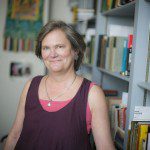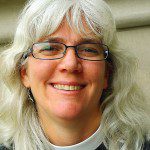By Melissa Browning.
Things aren’t always what they seem. Like that time God sent Amos a fruit basket. It was a tricky move. Generally speaking, a fruit basket is a wonderful, cheerful gift. Strawberries, blueberries, plums – or in Amos’ case, ripe figs. Everybody loves summer fruit. It reminds us of picnics, and parks, and cookouts with friends. But when God sent Amos a fruit basket, it came with a foreboding little note that proclaimed the end of the world.
This “dresser of sycamore trees” turned prophet knew something about fruit. He tended the sycamore figs that must be pierced before they would ripen.
God always speaks through what we know, so God shows Amos a fruit basket to create a play on words. The Hebrew word for “summer fruit” is qayits but the word for “end” is qets. Amos, what do you see? God asks. A basket of summer fruit, he says. And then we hear the reply from the Lord, “The end has come upon my people Israel…”
In the stories of the prophets, there is often a clear cause and effect. The passage continues by saying “dead bodies will be many, cast out in every place” because the people of God have trampled on the needy, they have been “buying the poor for silver and the needy for a pair of sandals.” In the midst of dystopia, the prophets appear on the scene to make connections for the people, showing them how the sin they have shored up in systems of injustice is now directly linked to the violence and pain they are experiencing or will experience.
Cause and effect. A simple concept we learned in elementary school with worksheets and classroom exercises. And here we see it again in the prophets. If we create a society that builds violence into systems, we will be left with dead bodies in the street.
We may not tend sycamore trees and we might not consider ourselves prophets, but we’ve seen dead bodies in the streets.
Philando Castile, Alton Sterling, police officers in Dallas, mass shootings in schools and night clubs and malls, the state-sanctioned death of those on death row, kids who die from hunger in our own neighborhoods… everywhere we look, we find death. Cycles of marginalization, violence, and retribution are playing out over and over and over again in our midst.
These things are painful to see. In fact, those who walk through life with privilege might never see them at all. But this is the task of people of faith—to see and to help each other see what is really there. God isn’t sending us a fruit basket. God is asking us to see the pain of the world. God is asking us to respond by rooting out the injustice that causes it.
When we begin to look with eyes of faith, we see the connections. Not the simple cause and effect we learned in elementary school, but a web of connections where injustices collide, creating not a culture of abundant life for all, but a reality that is dystopian for some and a picnic for others.
When you trample those on the margins, Amos tells us, things will not go well for you. The end of injustice is coming, whether or not you have eyes to see. Will we join God in heralding the arrival of justice? Or will we stand in the way?
As a professor who is also an activist, I count down the days until summer. Summer means the end of the semester—the end of grading!—and a time to rest and reset before the fall begins. But since I have become involved in anti-death penalty activism in Georgia, summers have taken on a new meaning. When the parole board is on vacation, there is a brief reprieve from the culture of state-sponsored killing that has taken hold in Georgia.
This past semester, I taught a course on restorative justice course that looked at mass incarceration, police violence, and the death penalty as interlocking injustices. My students were required to vigil during every execution in our state. In our short four-month semester, the state of Georgia killed five people. Five times we drove to death row or to the capitol to pray and protest. With each death, we grew weary. With each state-sponsored killing, our eyes were opened wider to see—to really see—the structural violence that is thick in the air we breathe.
By standing in solidarity with those on death row, we saw the arbitrary nature of the death penalty. Those who are executed were not the “worst of the worst.” But they were among the most marginalized in our society. Bryan Stephenson reminds us that “we persist in the death penalty because its only the poor, its only the marginalized, its only people of color that have to bear that risk.”
In our class, we began to ask how the presence of the death penalty and a culture of mass incarceration might impact police interactions with people on the streets, or how a belief that these systems are just might impact how people with privilege perceive these interactions. We live in a culture where the state is allowed to kill and where people of color are imprisoned at levels that are unconscionable. Are those who believe the death penalty and our prison system are just able to see the injustice of police violence? Mix this blindness with the blindness of racism and its no surprise that white Christians are more likely to say “all lives matter” rather than “black lives matter.” It is no surprise that a recent PRRI study showed us that 80 percent of black Christians believe police-involved killings are part of a larger injustice while 70 percent of white Christians believed they were isolated incidents.
The prophets call us to see deeply. To move beyond the simple cause and effect we often use to explain violence and injustice and to see the web of unjust connections that we have built.
In the wake of the horrific murders in Dallas, Shaun King reminded us that as we speak against the violence that took police officers’ lives, we must also admit that Micah Johnson is a product of the society we have created. King uses the analogy of baking a cake as he talks about the bitter ingredients that formed our society—from the genocide of indigenous peoples and slavery to modern-day racism and a society that has more guns than people. King then asks, “How did we expect this would turn out? Did we sincerely think that we were going to pile bitter ingredients on top of each other for years on end and not get something like what we see in Dallas right now?”
Here in Georgia, our summer vacation was short lived. The parole board members must be back from the beach. Another execution has been set for John Wayne Conner on Thursday, July 14th. Violence begets violence begets violence.
The prophets continue to call. Do we see a basket of summer fruit, or dead bodies in the street?
Bible Study Questions:
- What injustices are easy for you to see? What injustices are more difficult to see?
- How can we help each other see injustice in ways that call us all into a deeper faith?
- How has your own social location—your race/ethnicity, gender, age, etc.—colored the way you see issues like the death penalty, mass incarceration, or police violence?
For Further Reading:
Shaun King, “KING: Micah Johnson is the making of America’s own racist creation,” NY Daily News, July 8, 2016
Emilie Townes, “The Problem We All Live With: Bearing Witness, But Never Finding Justice,” Religion Dispatches, July 10, 2016,
Bryan Stevenson, “We need to talk about an injustice”
 Rev. Dr. Melissa Browning is a theologian, ethicist, and activist who studies community-based responses to injustice. Melissa teaches seminary students at McAfee School of Theology at Mercer University where she is the Assistant Professor of Contextual Ministry. In this role, she teaches courses in practical ministry, community development, and community organizing.
Rev. Dr. Melissa Browning is a theologian, ethicist, and activist who studies community-based responses to injustice. Melissa teaches seminary students at McAfee School of Theology at Mercer University where she is the Assistant Professor of Contextual Ministry. In this role, she teaches courses in practical ministry, community development, and community organizing.
For the past seventeen years Melissa’s study and fieldwork has been tied to East Africa. Her most recent book, Risky Marriage: HIV and Intimate Relationships in Tanzania, builds on a year of fieldwork completed in Mwanza, Tanzania where women were asked to re-imagine Christian marriage as a space of safety and health for women.
Melissa is also active in death penalty abolitionist work in Georgia and worked as an organizer in the #KellyOnMyMind collective—a public clemency campaign for Kelly Gissendaner. Melissa is an ordained Baptist minister with the Cooperative Baptist Fellowship.
About ON Scripture – The Bible and the ON Scripture Committee
Like ON Scripture on Facebook
Follow ON Scripture on Twitter @ONScripture
ON Scripture – The Bible is made possible by generous grants
from the Lilly Endowment and the Henry Luce Foundation


















